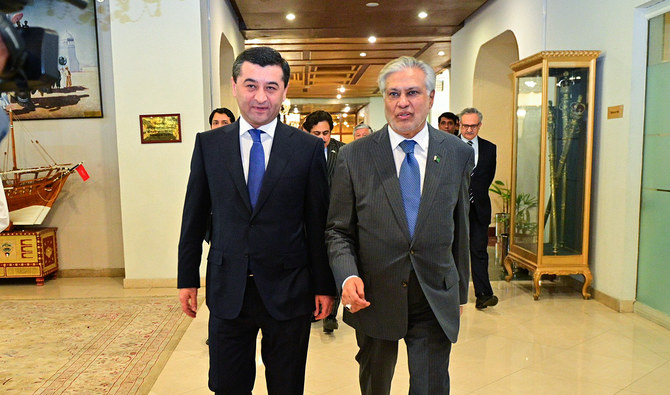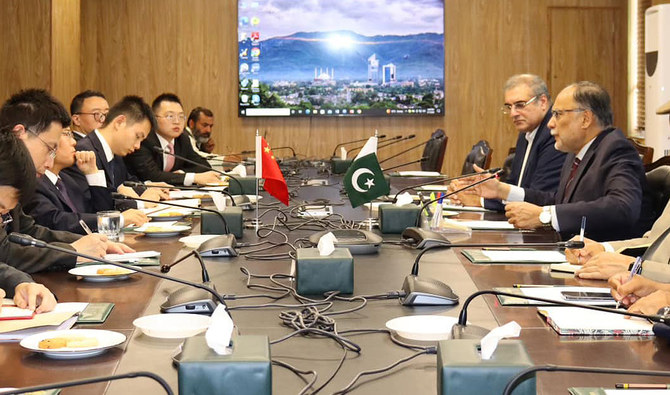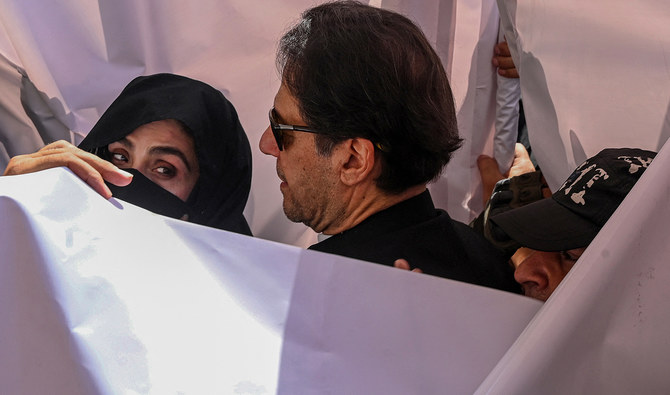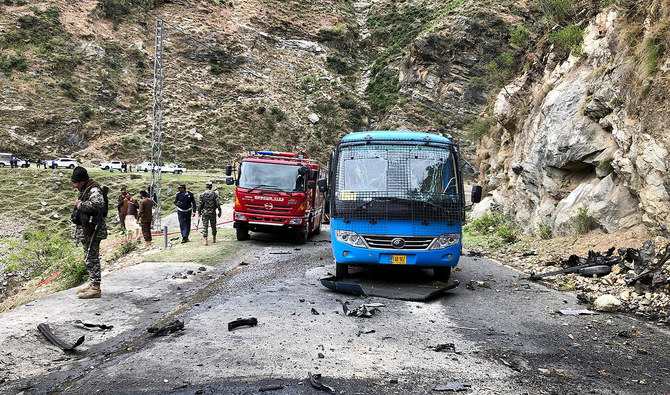KARACHI: In the quarrel over building a gleaming “new Dubai” on two small islands off Pakistan’s Arabian Sea coast, the voices of the fishermen who have plied these waters for centuries often go unheard.
Steering his boat out of the Jamote jetty in the village of Ebrahim Haideri, 25-year-old fisherman Shakil said the islands around which he catches fish, crab and shrimp are now patrolled by armed guards.
“We have been fishing in these waters for centuries,” said Shakil, who did not want to give his full name. But when he tried to go near the island of Dingi recently he was apprehended by military guards and ordered to get into the “murgha” stress position, he said.
“If we did not do it they said they would hit us with batons,” he told the Thomson Reuters Foundation.
A month ago, the twin islands of Bundal and Dingi at the mouth of Qur’angi Creek in the port city of Karachi in Pakistan’s Sindh province were taken over by the federal government through an overnight presidential ordinance.
With an investment of about $50 billion, the government aims to develop a city that will “surpass Dubai” and create 150,000 jobs, Sindh Governor Imran Ismail said at a news conference in the capital Islamabad earlier this month.
But fisherfolk say the development on the islands — spread over 12,000 acres (49 square kms) — could destroy their livelihoods and that they have not been consulted.
“We continue to remain invisible to both the (Sindh and federal) governments,” Mohammad Ali Shah, founder of the Pakistan Fisherfolk Forum (PFF) that aims to protect the rights of fishermen and fishing communities, told the Thomson Reuters Foundation.
Nasir Hussain Shah, the Sindh government’s information minister, rejected the central government’s takeover of the islands and said Islamabad had not shared its development plans. Pakistan’s Minister for Maritime Affairs, Ali Haider Zaidi, did not respond to a request for comment.
The PFF is leading a protest campaign against the island development, arguing the fishermen are “the rightful owners” of the territory. It has called upon the provincial government to protect the rights of Sindh’s fishermen.
“Do not think of these islands as mere tracts of land,” said Shah. “We are inextricably linked to them by culture, custom and heritage.”
He said thousands of fisherfolk and their families gather for traditional festivals on these islands every year.
But more importantly, the fishing communities are concerned about the impact of construction — and the diversion and pollution of water — on the islands’ fragile ecosystem.
“After the creeks dry up, the mangroves will die. This, in turn, will destroy the habitat of many marine creatures which is a source of our livelihood,” Shah said.
LIVELIHOODS
Fishing provides employment to 600,000 people in Sindh province, according to Sindh Fisheries Department’s director, Aslam Jarwar.
“Seventy-one percent of Pakistan’s fish comes from the province through the Arabian Sea, estuaries, canals and inland lakes,” he told the Thomson Reuters Foundation.
The coastal waters are the habitat for 40 species of fish and shellfish and 15 species of shrimp, which make up 60% of Pakistan’s fisheries exports.
For fisherman Kamal Shah, the development will spell disaster: “They might as well kill us; we exist because of these islands, if they occupy them, it will be a death blow to our livelihoods,” he said.
Although no one lives permanently on the islands, lawyer Shuhab Usto said the fisherfolk had customary rights to use the land. He said it is clear the islands have been used as “transit stations” and “easement” by the fishermen for centuries.
“Suddenly dislodging them and depriving them of their right to earn a living is not legally tenable,” as it contravenes Articles 9 and 18 of Pakistan’s constitution, he said.
And the takeover of the islands has caused legal confusion for the fisherfolk, he said.
“Which high court do the complainants (fishermen) take their petition to? If the islands are the federal government’s property, these are beyond the territorial jurisdiction of the Sindh High Court,” he said, while the high court in Islamabad would not have jurisdiction over the territory.
PROMISED EMPLOYMENT
The government has promised employment for the fisherfolk once construction work gets started although no details have been shared. Kamal Shah is skeptical.
“In the last over two decades the fishermen had been ousted from three prime fishing spots. Not only that, no villager has been employed either,” Kamal Shah said, adding that not only have fish stocks dwindled, but the areas in which the fishermen can cast their nets has shrunk due to development.
“Our people ... used to fish where you now see the Marina Club and that string of restaurants,” he said, pointing in the direction of the private club reserved for the wealthy to moor their boats. “We are shooed away from there,” he said.
A nearby Pakistan Air Force base and the Port Qasim Authority, controlled by the Ministry of Maritime Affairs, are high security zones and security patrols prevent fishermen from entering the surrounding waters.
“The same will happen when developers come on these islands; we will be told we are trespassing,” said Shah.
The father of eight does not want his children to join his profession. “All my kids are studying,” he said with pride. “It is best they keep away from this.”
It is not the first time the islands have been eyed for development. In 2006, the government signed the multi-billion-dollar Diamond Bar City project with a Dubai-based real estate firm to develop the islands.
And in 2013, Pakistani real estate tycoon Malik Riaz signed an agreement with a US investor to build the “world’s tallest building” on the island city. Nothing materialized from either deal.
Mohammad Ali Shah, the PFF’s leader, said he was hopeful the latest development plans would also be quashed.
“We want the governments, for once and for all, to make a policy that these islands will remain their natural self,” he said.
Pakistani fishermen fear development of islands into ‘new Dubai’ could empty their nets
https://arab.news/jw7bj
Pakistani fishermen fear development of islands into ‘new Dubai’ could empty their nets

- Bundal and Dingi taken over by federal government through an overnight presidential ordinance last month, $50 billion investment planned
- Fisherfolk say they have not been consulted, are leading a protest campaign saying fishermen are “the rightful owners” of the islands off Arabian Sea coast
Police disperse Lahore lawyer protest with tear gas, batons over court relocation

- Clashes broke out when lawyers tried to remove police barriers and tried to enter the Lahore High Court
- Police say they used tear gas, batons and water cannons after lawyers started throwing stones at them
ISLAMABAD: Police in Pakistan’s eastern city of Lahore used tear gas and batons on Wednesday to disperse hundreds of lawyers protesting the relocation of civil courts in Model Town, with live images of the clashes broadcast by local news channels.
The Lahore Bar Association, which organized the protest, also criticized authorities for registering terrorism cases against its members in an attempt to silence dissent.
As the demonstration unfolded in front of the Lahore High Court, lawyers attempted to remove barriers set up by the police to enter the building.
The police responded with tear gas, batons and water cannons, arresting dozens of lawyers.
Speaking to Pakistan’s Geo News channel, Deputy Inspector General (DIG) Faisal Kamran stated that while law enforcement showed restraint, they would not permit any breaches of the law.
“The police are demonstrating maximum patience and restraint,” he said, noting they only used tear gas after lawyers threw stones at them.
He added that one station house officer and one constable were injured.
Protests by lawyers are relatively common in Pakistan and have been a notable aspect of the country’s political and social landscape. These protests can be sparked by a variety of issues ranging from judicial appointments and legal reforms to specific grievances related to court administration and the treatment of lawyers themselves.
Local news channels reported the clashes in Lahore disrupted traffic, creating inconvenience for commuters on The Mall and surrounding areas.
Amid investment push, Uzbek foreign minister in Pakistan to discuss trade, regional connectivity

- The government has been hosting official and business delegations to address the economic challenges faced by the country
- Pakistan is interested in reliable Central Asian energy sources and sees Uzbekistan as gateway to other markets in the region
ISLAMABAD: Uzbekistan’s Foreign Minister Bakhtiyor Saidov arrived in Pakistan for a two-day visit on Tuesday night to discuss bilateral trade and regional connectivity, confirmed a brief statement circulated by the foreign office, as the administration in Islamabad is trying to bolster economic ties amid financial challenges.
A Saudi business delegation recently concluded its visit to the country where its members held a series of business-to-business meetings to explore investment opportunities across various sectors during their visit.
This was followed by a meeting between Prime Minister Shehbaz Sharif and Japanese industrialists, where the PM encouraged them to invest in Pakistan’s electric automotive industry. Similarly, Federal Minister for Finance Muhammad Aurangzeb engaged with international investors, assuring them of the country’s commitment to create an enabling business environment. The impending visit of Saudi Crown Prince Mohammed bin Salman, expected this month, is anticipated to bring several billion dollars in investments.
The Uzbek foreign minister’s trip also highlights the strengthening bilateral relations between the two states and aligns with Pakistan’s objectives of enhancing regional connectivity for greater economic prosperity.
“Foreign Minister Saidov will call on Prime Minister Muhammad Shehbaz Sharif and hold in-depth talks with Deputy Prime Minister and Foreign Minister Mohammad Ishaq Dar on a wide range of bilateral issues of mutual interest, with special focus on trade and connectivity,” the foreign office said in a statement released before his arrival.
“The visit of the Foreign Minister of Republic of Uzbekistan is expected to provide fresh impetus to the friendly relations between the two countries,” it added.
Pakistan views Central Asian countries as crucial partners in enhancing regional trade and energy security.
The region’s vast natural resources, especially oil and gas, can be vital for Pakistan to secure reliable energy sources and diversify its energy imports.
Uzbekistan plays a key role in this equation due to its geographical position and resources, acting as a gateway for Pakistan to access other markets in the region.
Last year, Pakistan’s former caretaker prime minister Anwar-ul-Haq Kakar visited the Central Asian country to participate in an Economic Cooperation Organization (ECO) meeting where he reiterated his country’s commitment to regional cooperation and economic integration.
Pakistan invites China to establish industrial zones for electric car manufacturing

- Earlier this year, Pakistani car maker Sazgar Engineering unveiled electric car made in collaboration with China
- Road transport is significant contributor to pollution as around 23 percent of Pakistan’s greenhouse gases come from vehicles
ISLAMABAD: Pakistan’s planning minister has invited China to collaborate with Islamabad in setting up industrial zones to manufacture electric cars amid a renewed push to attract foreign investment, state news agency APP reported on Wednesday.
The government of Pakistan approved an ambitious National Electric Vehicles Policy (NEVP) in 2019 with the goal of electric vehicles comprising 30 percent of all passenger vehicle and heavy-duty truck sales by 2030, and an even more ambitious target of 90 percent by 2040. For two- and three-wheelers, as well as buses, the policy set a goal of achieving 50 percent of new sales by 2030 and 90 percent by 2040.
In a meeting with Chinese officials on Tuesday, Planning Minister Ahsan Iqbal invited them to collaborate on the production of electric cars.
“He emphasized Pakistan’s aim to establish industrial zones for the manufacturing of electric cars in collaboration with China, leveraging Pakistan’s competitive advantage to reduce overall production costs and create employment opportunities for Pakistani workers,” APP reported.
Earlier this year, Sazgar Engineering, one of Pakistan’s leading car manufacturers, unveiled the electric vehicle “ORA 3,” manufactured in collaboration with Chinese car manufacturer Great Wall Motors (GWM).
The urban areas of Pakistan exhibit some of the world’s highest levels of air pollution, primarily due to sub-2.5 μm particulate emissions. This issue significantly impairs both the country’s economy and the quality of life of its residents. Road transport is a significant contributor to air pollution as around 23 percent of Pakistan’s greenhouse gas emissions originate from vehicles.
On Tuesday, Prime Minister Shehbaz Sharif also met a delegation of Japanese industrialists in Islamabad and invited them to invest in Pakistan’s electric automotive industry.
“There is a wide potential for investment in the electric vehicle industry in Pakistan and Japanese companies with the best technology can take full advantage of it,” Sharif told the Japanese group.
Pakistan court orders Imran Khan’s wife to be moved from house arrest to Adiala Prison

- Bushra Bibi had petitioned court to shift her from Bani Gala home to Adiala Jail where Khan is also imprisoned
- Bushra has been handed two sentences, 14 years in graft case and 7 years for violating Pakistan’s marriage law
ISLAMABAD: The Islamabad High Court (IHC) on Thursday ordered that ex-premier Imran Khan’s wife Bushra Bibi be transferred from her Banigala residence, declared a sub-jail, to Adiala Jail, where her husband is incarcerated.
Bushra has been living under house arrest at her husband’s sprawling Bani Gala mansion in Islamabad since Jan. 31 when both were sentenced to 14 years in prison in a case that relates to accusations they undervalued gifts from a state repository and gained profits from selling them while Khan was prime minister from 2018-22. Khan is jailed at Rawalpindi’s Adiala Jail.
In February, Khan and his wife were also sentenced to seven years on charges they violated the country’s marriage law when they wed in 2018 — the fourth sentence for Khan and the second for his wife.
Bushra had petitioned the court several months ago that she should be moved to Adiala and the IHC had reserved its verdict in the case on May 2.
“Court has annulled notification of house arresting former first lady Bushra Bibi at Bani Gala sub-prison and ordered her transfer to Adiala Prison,” Khan’s Pakistan Tehreek-e-Insaf political party said in a message to reporters.
During Thursday’s hearing when the court reserved its judgment, Bushra’s lawyer Usman Gill said after her sentencing in the state repository case by the trial court, his client went to Adiala Jail as per the trial court order which was also forwarded to the jail superintendent. But on the orders of the interior ministry, the chief commissioner issued an “illegal notification for transfer” to Bani Gala, the lawyer argued.
“There was no instruction from the authorities concerned regarding the transfer from Adiala Jail to Banigala,” he said.
“Neither the provincial government nor did the Punjab prisons inspector general issue any such directive [for transfer] … The place of imprisonment was to be determined by the trial court and not the chief commissioner.”
The state’s counsel argued that Bushra was moved to Bani Gala because of security threats.
“Were the 141 women who were brought to Adiala after Bushra less privileged?” the judge hearing the case asked, saying they too should be imprisoned at their homes then.
“Sometimes you say that [you] cannot present her [Bushra] in the court as there are threats and at times, you say that the jail is not secure. Are you secure?” the judge quipped. “If I am confined in my home by my own will, I would be very happy but how can a prisoner’s property be turned into a sub-jail against his will?”
The IHC subsequently reserved its verdict on the petition.
CASES
In a separate petition to the court filed last month, Bushar, a deeply religious woman widely believed to be Khan’s spiritual guide, alleged she was being poisoned through contaminated food and subjected to “mental and physical torture which is becoming a serious threat to her health and life.” She also alleged that her room and bathroom had been bugged and multiple hidden cameras installed in a “blatant violation of her privacy, dignity and honor.”
The petition said Bushra was only given ten minutes for meetings with family members and lawyers, with five jail staff supervising at all times.
Khan was first jailed after being handed a three-year prison sentence in August 2023 by the Election Commission for not declaring assets earned from selling gifts worth more than 140 million rupees ($501,000) in state possession and received during his premiership. In January, Khan and Bushra were handed 14-year jail terms following a separate investigation by the country’s top anti-graft body into the same charges involving state gifts.
An anti-graft court in Islamabad also handed Khan a 10-year jail term in January for revealing state secrets, a week before national elections on Feb. 8. The ruling on his marriage to Bushra and a seven-year sentence each for both also came ahead of the polls.
Khan has also been indicted under Pakistan’s anti-terrorism law in connection with violence against the military that erupted following his brief arrest related to the Al-Qadir case on May 9. A section of Pakistan’s 1997 anti-terrorism act prescribes the death penalty as maximum punishment. Khan has denied the charges under the anti-terrorism law, saying he was in detention when the violence took place.
Khan’s convictions, which mean he is banned from holding public office, ruled the 71-year-old out of the February general elections. Arguably Pakistan’s most popular politician, Khan says all cases against him are motivated to keep him out of politics.
Taliban reject Pakistan’s claim Afghan bomber involved in deadly attack on Chinese dam engineers

- Afghan defense ministry says the killings of Chinese nationals reflected the weakness of Pakistan’s security agencies
- Pakistan believes Kabul not doing enough to tackle militant groups, launched airstrikes targeting them in Afghanistan
KABUL: The Taliban defense ministry on Wednesday rejected Pakistan’s allegations that Afghans were involved in an attack on Chinese engineers, as ties between the neighboring nations sour amidst rising insecurity.
Pakistan’s military had said at a press conference on Tuesday that a suicide bomb attack in March in Pakistan’s northern Khyber Pakhtunkhwa province, that killed five Chinese engineers, was planned in neighboring Afghanistan, and that the bomber was an Afghan national.
“Afghans are not involved in such matters,” said Mufti Enayatullah Khorazmim, the spokesperson for Afghanistan’s Taliban-run Ministry of National Defense.
“Blaming Afghanistan for such incidents is a failed attempt to divert attention from the truth of the matter and we strongly reject it,” he added.
A suicide bomber rammed a vehicle into a convoy of Chinese engineers working on a dam project in northwest Pakistan in March, killing six people.
“The killing of Chinese citizens in an area of Khyber Pakhtunkhwa that is under tight security cover by the Pakistan Army shows the weakness of the Pakistani security agencies,” Khorazmim said.
Relations between Pakistan and Afghanistan have soured in recent months. Islamabad says Kabul is not doing enough to tackle militant groups targeting Pakistan and in March Pakistan carried out airstrikes targeting militants on Afghan territory.
Last year, Pakistan expelled nearly 370,000 undocumented Afghan nationals, saying the majority of suicide attacks against its security forces were carried out by Afghans, a charge Kabul rejected.
Pakistan’s military spokesman said on Tuesday that security for 29,000 Chinese nationals in Pakistan, many of them working on infrastructure projects, was the top priority for security institutions.
The Taliban are also seeking economic ties with China, the first country to formally appoint an ambassador to Kabul under the Taliban, and wish to join China-Pakistan Economic Corridor (CPEC), which is Beijing’s $65 billion investment in development and infrastructure.










